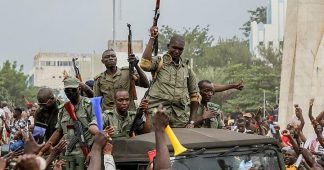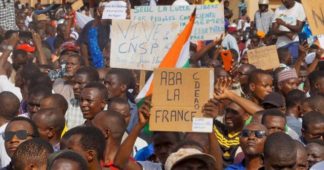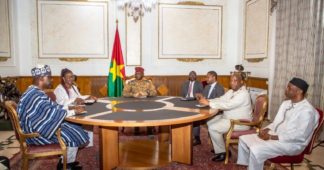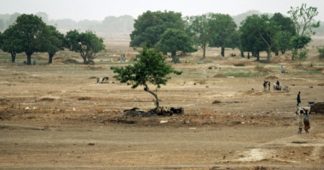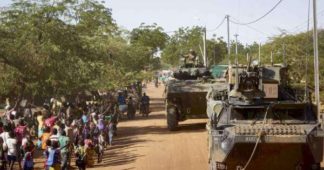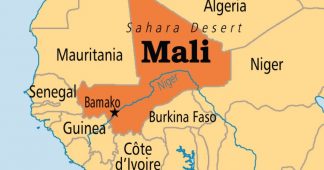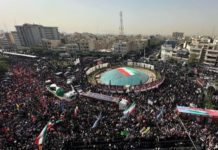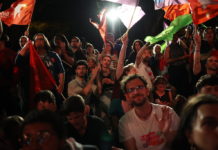Nigeria’s Senate refuses to support ECOWAS plan for West-backed military intervention
A day after ECOWAS chiefs of staffs finalized plans for a military intervention, Nigeria’s Senate refused to support President Bola Tinubu’s proposal to deploy soldiers. Tinubu is the current chair of ECOWAS. Meanwhile, Niger has seen multiple demonstrations in support of the coup that overthrew Mohamed Bazoum
By Pavan Kulkarni
August 05, 2023
The regional bloc, Economic Community of West African States (ECOWAS), has drawn up a plan for a military invasion of Niger to restore the ousted Mohamed Bazoum to presidency. However, in Nigeria, whose president Bola Tinubu is the current chair of ECOWAS, the Senate has refused to support the military intervention.
On Saturday, August 5, at a closed-door executive session to deliberate on Tinubu’s letter seeking the Senate’s support for “military buildup and deployment of personnel for military intervention,” “almost all senators… totally ruled out the military options,” an unnamed senator told Premium Times.
Pointing out that “our military is highly ill-equipped and not prepared to fight any war,” the Senators argued that “the Federal Government should focus on solving the Boko Haram, banditry, and ESN/IPOB menaces… instead of contemplating going to war in a foreign country.”
The war plans were prepared at a meeting of the chiefs of staff of ECOWAS member countries which ended on Friday, August 4. “All the elements that will go into any eventual intervention have been worked out here, including the resources needed, the how and when we are going to deploy the force,” said Abdel Fatau Musah, ECOWAS Commissioner for Political affairs, Peace and Security.
Earlier on July 30, ECOWAS had threatened military invasion of Niger if its military junta, the National Council for the Safeguard of the Homeland (CNSP), did not restore Bazoum as the president by Sunday, August 6. He was ousted on July 26 in a popularly-welcomed coup by Gen. Abdourahmane Tchiani, who was the head of the Presidential Guard.
France, which has up to 1,500 troops in Niger, and the US, with another 1,100 troops in two bases, are both backing ECOWAS. US Secretary of State Antony Blinken said on Thursday, August 3, “We strongly support the very strong leadership of ECOWAS on Niger.” White House National Security Council spokesman John Kirby added that there was still “time and space” for diplomacy, but that “window is not going to be open forever.”
While the US President Joe Biden said that the “Nigerien people have the right to choose their leaders,” the “Nigerien people,” who perceive Bazoum as a corrupt puppet of France, have repeatedly mobilized in tens of thousands to support the coup.
A coalition of 14 trade union centers called the Unité d’Actions Syndicales du Niger (UAS-Niger), which had been demanding the withdrawal of French troops, has supported the coup and called on Nigeriens to rally behind the CNSP.
As Nigeriens celebrated the anniversary of its independence from France on August 3, the CNSP terminated five military agreements signed with France between 1977 and 2020, allowing the former colonizer to station up to 1,500 troops in the country.
Donning T-shirts with coup leader Tchiani’s image, thousands took to the streets once again that day, sloganeering “Down with France,” and demanding the withdrawal of its troops and other foreign forces, including those of Italy which has 300 soldiers and the European Union (EU) which has a smaller contingent.
The mass-demonstration was organized by the anti-imperialist M62 Movement, formed last year as a coalition of 15 civil society organizations which have been protesting against French deployment in the country for at least two years. One demonstrator said, “It is only security that interests us..[whether it is provided by] Russia, China, Turkey…We just don’t want the French who have been looting us since 1960.”
France, however, has refused to withdraw its troops, with its foreign ministry’s spokesperson Anne-Clair Legendre saying, “We don’t answer to the putschists. We recognize one constitutional order only, that of President Bazoum.”
Under detention by the army, Bazoum, who had instituted a crackdown on the anti-French movement in the country, wrote a column in the Washington Post on independence day, calling for US intervention to restore his power. A US warplane C-17A — which is “is capable of rapid strategic delivery of troops and all types of cargo to main operating bases or directly to forward bases in the deployment area” — arrived in Benin shortly after its government declared support to the military intervention.
In the meantime, as a part of ECOWAS sanctions, Nigeria has stopped electricity supply to Niger. While Niger’s high-grade uranium is used to power a third of the light bulbs in France, its own electrification rate is less than 18%. Up to 90% of its power is imported from Nigeria.
Difficult times
“The weeks and months to come will certainly be difficult for our country. Those who oppose us have no limits when it comes to defending their selfish interests. They will only stop in the face of the firm determination of the Nigerien people,” Tchiani said.
Suspending Niger’s diplomatic ties with France, the US, Nigeria, and Togo, also an ECOWAS country, Tchiani warned that “any aggression or attempted aggression against the State of Niger will see an immediate and unannounced response from the Niger Defense and Security Forces.”
Mali, Burkina Faso and Guinea — three other suspended members of ECOWAS, sanctioned after similar popularly-supported coups — have expressed support to Niger. Together, they make up nearly 60% of the total land-area of ECOWAS countries. Mali and Burkina Faso, whose military juntas ordered the French troops out of their countries after taking power, have said they will mobilize their forces in defense of Niger if it is attacked.
The Vice-President of the CNSP, Lt. Gen. Salifou Mody, traveled to Mali and met its president, Colonel Assimi Goita. He also held a meeting with “someone from Wagner” while in Mali, AP reported. Mody also met with Burkina Faso’s leader, Captain Ibrahim Traore, and spoke about ECOWAS.
“We spoke precisely about this situation because we would not like Niger to become the new Libya,” Mody said, adding that they have decided to “undertake a number of activities to be able to deal with the situation.”
Ivory Coast, Benin, and Senegal have pledged to send troops for the ECOWAS invasion. Chad, whose president also took power in a coup but remained in the West’s good books, not having demanded the withdrawal of French troops, has refused to take part in the military intervention.
While supporting the call for restoration of Bazoum, Niger’s northern neighbor Algeria, has opposed “foreign military intervention,” which it said will “only complicate and exacerbate the current crisis.” Russia had also called for the restoration of constitutional order, but opposed military intervention.
Peoples’ movements across West Africa and other parts of the continent have opposed military intervention, and called for the withdrawal of all foreign bases in Niger and other countries of the region.
In a statement on August 4, the Workers Democratic Way party in Morocco expressed its “strong rejection and condemnation of the imperialist threats, especially from the French, of direct military intervention or through its puppet regimes in the region against Niger,” adding that “a war could ignite the entire region, leaving behind destruction, loss of lives, and horrific tragedies.” The Party further affirmed “the right of the Nigerien people to self-determination away from foreign interference.”
The Communist Party of Kenya condemned foreign military bases in Africa, which serve “as instruments of imperialistic control.” The party added that the “presence of these military bases deepens historical wounds of colonization and reinforces the oppressive grip of foreign powers. We call for the immediate dismantling of all foreign military bases in Africa to protect our dignity and freedom.”
Also read
Military intervention in Niger ‘direct threat to Algeria’ says president
We remind our readers that publication of articles on our site does not mean that we agree with what is written. Our policy is to publish anything which we consider of interest, so as to assist our readers in forming their opinions. Sometimes we even publish articles with which we totally disagree, since we believe it is important for our readers to be informed on as wide a spectrum of views as possible.
